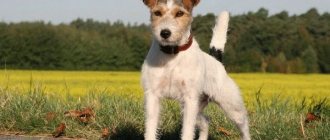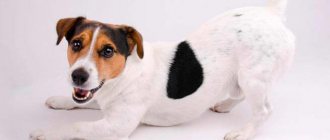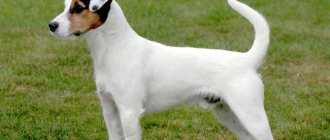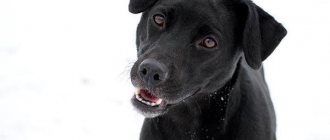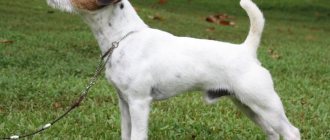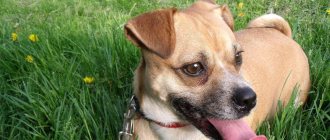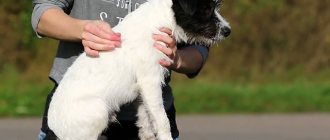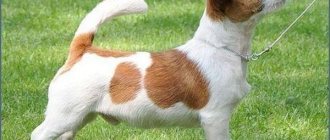Almost 2 years ago, Santa Claus brought a little Jack Russell terrier puppy to his daughter as a New Year's gift. Sophia asked for a dog, and we didn’t mind. We agreed with the good wizard that the pet should be a certain breed. The husband was in favor of the dog looking like a dog. And he even gave an ultimatum: he will not walk with a Spitz or Yorkshire terrier. Everyone liked Jack Russell. We read reviews about the breed and character. We decided that this kind of dog would be right for us.
Is it easy to handle an energetic Jack Russell Terrier puppy?
Jerry may be a Jack Russell, but he is not a “purebred”. His mother is a wire-haired terrier, and his father is a smooth-haired terrier. Our handsome guy took after his dad. Color: black and white. The rest of the puppies in the litter were like their mother, white and brown, wire-haired, with beards.
When we got him, he was only two and a half months old. I remember well the first night together: the puppy whined all the time, did not fall asleep for a minute. This is the gift we received. But we understood perfectly well what responsibility we were taking on when we got a dog.
And yet Jerry was a wonderful “child”; he was mischievous, of course, but not much. I remember once “reading” my daughter’s textbook and chewing the wire from the laptop. And when he opened the box with threads and needles, they were more afraid for him than upset about the damaged sewing kit. They were afraid that the needles would end up in his stomach. But, thank God, it worked out!
Jerry was never particularly annoying, insolent, or troublesome. From the very beginning, he was and is as he should be: the most beloved and good - ours.
Features of caring for a Jack Russell Terrier puppy
Caring for a puppy is more difficult than for an adult Russell, but babies are easier to train: they are less stubborn, remember the rules faster and recognize the leadership of the owner.
Keeping him in an apartment implies restriction of freedom and a clear schedule, to which Russell must be accustomed from childhood. Properly organized time will help to avoid the hyperactivity of the Jack Russell Terrier, unwanted wet spots on the carpets and begging during lunch.
Usually the baby reaches its owner at the age of 60–90 days. At this time, the jack is already eating on its own and can analyze the surrounding situation. The baby needs enhanced meals of 40–50 grams five times a day, walking four times a day, a lot of affection and regular combing of the fur.
On a note. Features of care depend on the personal characteristics of the Russell. If he has a congenital chronic disease (for example, a tendency to allergies), then it is important to reduce the likelihood of the dog coming into contact with the allergen.
Jerry's first teacher was the old black cat Tisha
Jerry, who came to us, was not the first and not the only animal in the family. At that time, we still had an old black cat Tisha and a hamster Shura living with us. If, of course, the puppy and Shura had no common interests, then the presence of the cat did not leave the baby indifferent.
Somehow, the animals immediately established their own hierarchy in relationships. The cat was able to convey to the playful youth: he is in charge in this territory.
The 18-year-old, in principle, had little to do with anything, but he was always strict with the puppy. Jerrick wanted to play with him, but he just waved him off with his paw. But still the puppy was afraid of the cat. If Tisha sat at the door of the room, Jerry never left first. They walked funny after each other: the cat in front, the puppy behind. Silence walks and walks and stops, and the dog just sits down. Tisha also taught his friend how to beg. When I was cooking something in the kitchen, the cat stood on its hind legs and moved with its front legs. Jerrick is doing the same now.
The cat died about six months after we got the dog. I really miss him. I've had him since 8th grade. My mother and I got Tisha almost immediately after moving from Kazakhstan to Belarus in 1998. My daughter and I wrote a scientific paper for school about this purr, a cross between a Siamese cat and an ordinary yard cat. Silence is a whole period of our life. A sort of savage who only in his old age began to allow himself to be stroked. And if he didn’t want to be touched, he hit him with his paw, but, surprisingly, he never let go of his claws. I kept worrying: maybe the cat got sick because we got a dog?
One day after the New Year, I discovered a small pimple on his nipple. It became inflamed and quickly enlarged. In the vet. were examined at the clinic. The diagnosis was disappointing: oncology. Due to the animal's age, doctors refused to perform surgery. They were afraid that the cat would not tolerate it. And the intervention really had to be complicated: it was necessary to remove the entire lymphatic system. Tisha’s tumor was then removed locally. After the operation, the cat lived for another 3 months. He was a fighter! Until the last moment, even though he was in pain, he did not go under himself. He climbed off the bedding and crawled towards the diaper. We gave him IVs every day. Everyone hoped that he would recover and live longer. The last night I suffered greatly, and when we went to the clinic in the morning, I died on the way. This is a very big loss for all of us: Tisha was a real member of the family. One thing is reassuring that he was already 18 years old: he seemed to have aged...
Recently I dreamed of Tisha: there was a fire in the kitchen, and the cat walked back and forth, and everything became quiet. I thought: what would this be for? Maybe some kind of misfortune my favorite averted from us?
Last weekend I went to a cat show with my husband and daughter. So I liked one kitten, a British fold, red-haired. After Tisha’s death, I was sure that I would never have a cat again, but then I suddenly thought: maybe it’s still worth it?
Why shouldn't you get a Jack Russell Terrier?
Let's talk about the disadvantages of the Jack Russell Terrier breed. There is another side to the coin...
If someone watched the comedy “The Mask” with Jack Russell Terrier Milo, fell in love with the breed and is already running to choose a puppy, we advise him to slow down and carefully consider his decision. There is no universal dog that suits everyone! So, today we will talk about the disadvantages of the breed.
Hyperactive bullies
Future owners of Jack Russell Terriers, first of all, should have a large amount of free time, which they are ready to actively spend with their pet. The Jack Russell Terrier is a working dog and in order for it not to cause trouble at home, the pet must be provided with sufficient daily exercise and exercise. Jackies can splash out their energy on walks during active games, but these games must be long.
If the dog is deprived of the opportunity to move, then it will perfectly find entertainment in the house, destroying your repairs and interior items. And the Dog is deprived of the ability to move, and, in addition, the person’s company will find another profession. Invisible in the right transporter during the absence of family members, the puppy can destroy the apartment's equipment.
However, the Jack Russell Terrier is often described as a hyperactive, uncontrollable dog. This is wrong. With proper exercise at home, he turns into a wonderful, sweet dog.
Little terrorists
We must understand that Jack Russell terriers are real hunters, whose task is to lure the animal out of the hole. Few dog breeds can compete with them in persistence, sharpness and real hunting passion!
If you live in a private house with an adjacent territory, then be sure that your household will be quickly freed from pests such as moles or rats, but after the pests, other animals, for example, cats or hedgehogs, as well as young ones, can become victims of restless hunters. birds.
The Jack Russell Terrier feels best in a pack of its own kind, but it should be remembered that Jacks are very jealous of other people's dogs on their territory. Therefore, you need to keep in mind that a pack of Jacks can turn into a real terrorist group that will keep the neighbors' dogs and cats at bay!
Runaways
Despite his affection for his owner, the Jack Russell often cannot control his desire to explore the world or hunt. Remaining on a leash during walks in the park, he can plot his escape for a long time and wait for the longed-for moment when his owner will finally let him run. And when this finally happens, no calls from the owner can stop the little fugitive!
Neighbors' favorites
Contrary to popular belief, Jack Russell terriers are not loud barking dogs, however, Jack left alone at home for a long time can become a very unpleasant surprise for your neighbors. Jackies rarely bark at people, but a neighbor's cat walking along your balcony or pigeons on the windowsill can awaken serious excitement in him!
The intensity of barking is an individual feature of a particular Jack Russell, because there are dogs with more or less excitability.
Thieves' Best Friends
Love for people is a characteristic breed trait of Jack Russell Terriers. That is why these restless terriers are completely unsuitable as guards! They will lick any intruder to death! This trait may also not be very convenient during normal walks, since Jackies trust people too much and happily make contact with everyone, regardless of the person's intentions in response.
White fur all around!
Jack Russell Terriers come in three coat types. Each type has its pros and cons. Short wool is much easier to care for and does not require special housekeeping care, unlike coarse wool, which must be plucked regularly.
However, Smooth Jack Russell Terriers shed much more than their Wire coated counterparts! Therefore, when getting yourself a “smoothie”, be prepared for the fact that your entire house will be covered with short white hairs, which can be seen on absolutely everything! Yes, regular cleaning and a powerful vacuum cleaner will greatly simplify the situation, but know that Jack owners can easily distinguish each other in a crowd by the white hairs on their clothes!
Well, that’s probably all we could tell you about the “dark” side of the Jacks. If the above does not scare you, then welcome to our world - the world of lovers of this wonderful breed
What is the character of a Jack Russell Terrier?
Jerry is very friendly. He loves people and dogs. As soon as he sees his four-legged friends, he rushes towards them and wants to play. One day the husky grabbed him by the collar and began to “whack” him. The next time he ran to play with her again, as if nothing had happened.
Hospitable. Always happy to everyone. He even brings his bones to his guests with joy. But the guard from Jerrick is no good. He's cowardly. If the doorbell rings, it barks from somewhere far away, but does not run to the door. And in the evening he will never go into the dark hallway alone, only with us.
Very loyal. Knows all of us, grandparents. But he doesn’t go with strangers. One day, my mother’s friend wanted to go for a walk with him. So he struggled so much, looked around, whined that she could not take him far, she returned and gave him back.
Not once in 2 years did he show any signs of aggression. He is very kind and affectionate. His favorite pastime is to lick his face and get to his ears.
Jack Russells are hunting dogs, and our Jerry remembers his instincts. True, he has never brought prey yet, but he loves all sorts of holes, cracks, and holes. And he digs and digs... Even in bed he keeps trying to dig some kind of hole.
I used to read reviews from owners that it is difficult to deal with Jack Russells at home: they spoil and chew everything because they have nowhere to put their energy and they need to be on the move all the time. I wouldn't say that Jerry is very tense. He sleeps a lot. If I’m doing something at home, he also fusses around or just lies there.
In general, our dog is a domestic dog. Moving is hard for him, he whines and gets agitated in the car. Even in the summer at the dacha he cannot calm down for a long time. It takes him a few days to get used to it, behave unnaturally, become too quiet and sad. With all his appearance he shows that he wants to go home.
I would say that these are fairly clean dogs. We had no problems with street training. While the vaccinations were being done, he was wearing a diaper. And at the dacha there are miracles: Jerry only goes to the toilet outside the site, and specifically goes outside the gate for this purpose.
Very attentive and caring. If one of us gets a wound or a scratch, he licks it. Like a cat, he knows when it hurts.
Health and treatment
The Jack Russell Terrier cannot be called sickly. This is an active dog with an athletic build and a strong spirit. If you properly care for your pet, it will live 12–15 years and will be on the move until old age.
To extend this period, it is recommended to undergo an annual examination by a veterinarian, and if signs of disease development arise, to begin treatment.
Common diseases:
Important. In addition to developing diseases as they grow older, Jack Russells also have congenital problems: Legg-Perthes disease (osteochondropathy of the femur), congenital deafness and strabismus.
Jack is a small dog that can easily fit into a city apartment, but that doesn’t make caring for him any easier. The terrier requires regular examinations by a veterinarian, vaccinations, and proper care of the ears, eyes, teeth and coat.
Russell is a hunter who may not get along in the same house with cats and rodents. Also, representatives of the breed do not always get along with children. However, the behavioral characteristics of Jack Russell Terriers are largely formed through education. Whatever the natural inclinations, a properly raised Russell will demonstrate the habits that the owner has developed in him.
How do Jack Russell Terriers treat children?
Jerry has a complete idyll with children. When they “feel sorry” with Sophia, there is no limit to the squeals and squeals. They even play a game together - wrestling. Jerry jumps on his daughter and tries to reach her ears, but she hides. They enjoy playing with balls and strings together.
Jerrick has a special relationship with his youngest daughter. Kira is only 6 months old, and he is like a nanny for her. When the baby wakes up, he runs to the crib first. And he sits and guards.
Maybe lick the baby’s heels. My daughter got used to it. Takes the dog for granted. After all, for her he was always there. We play with her on the floor or on the sofa, he is also with us. He gives his daughter his toys and shares them. He is always interested in what is happening in the house. I change Kira’s diaper, and he’s right there. Very curious, participates in all household chores.
Are Jack Russell Terriers easy to train?
Jerry is very trainable. And this despite the fact that only his daughter works with him. Like any child, she does this whenever she wants, not systematically. But he knows the basic commands very well. And the “gopher” does it, and turns over. Sophia watches video training lessons on YouTube, then practices it on Jerry. He works for encouragement and treats. But even without a treat, he later shows us what he has learned. We, of course, praise him. I think that anyone who sets the goal of making a trained dog out of a Jack Russell has very good chances. Dogs are smart and obedient.
We have difficulties on the street. Jerry has a lot of energy, and when he sees other dogs, he forgets about everything in the world. That's why we don't let him off the leash in the city, we're afraid he'll get hit by a car. But outside the city, at the dacha, there is freedom for him. He runs around so much that for the next two days we force him out into the street for a walk.
How easy are these dogs to care for?
The main problem is wool. She's everywhere! Jerry sheds a lot. And you have to constantly clean, vacuum, wash the floors, remove wool from clothes... Moreover, the wool is white. The dog needs to be brushed. The main misconception of new dog breeders is that smooth-haired dogs have little hair. There is a lot, a lot of it!
Last winter we realized that the dog needs to be dressed in the cold. He froze and fell ill with cystitis. I started going to the toilet often, and even peed in blood. They treated me and gave me antibiotics. And this is a problem for all short-legged dogs.
As I already said, Jack Russells are active dogs. That's why they need long walks. This responsibility falls mainly on the husband. But in good weather, both I and my daughter can walk with the dog.
We feed Jerry dry food twice a day. We tried to switch to natural nutrition. But it is very troublesome to follow all the rules. Plus, he developed allergies: bald patches began to form around his eyes. We switched to food again - everything went away. It’s simpler and more correct, it seems to me: it already contains all the necessary vitamins and supplements.
We indulge, of course. We buy him snacks and treats. He loves dog white chocolate. And also tea with milk! And this is his bad habit that we are unable to fight. He looks at you with such eyes that it is impossible not to share tea and a piece of bun with him.
Another omission in our upbringing: the dog does not have its own place. Jerry sleeps with us, with Sophia - with whomever he wants. And he simply doesn’t have his own place. We tried to lay out blankets and mattresses for him, but they instantly turned into scraps and rags, so we stopped making a “den” for him and went with our weakness and dog cunning.
Walking and physical activity
Keeping a Jack Russell Terrier is a lifestyle, because your four-legged pet will require daily walks, jogging, training, and care. This hyperactive dog can't sit still. Without a regular outburst of excess energy, the terrier will tear and damage furniture, chew shoes and dig in the ground.
Walking begins at 3 months, when the first vaccination cycle is completed. Take the Russell out 3-4 times a day for 20 minutes. You should not walk a small terrier in crowded or noisy places; he needs to get used to the world around him, understand what is around him.
After 20–30 days, you can begin socialization and introduce the Jack Russell Terrier to other animals and people. At this time, the terrier is taken to public gardens, dog parks, noisy streets, train stations, and stations.
From the age of six months, the puppy is given two walks a day: morning and evening for 1.5 hours. By this time, he should understand that he can relieve himself only on the street and at a certain time.
Physical activity for a terrier should be limited: no more than 5 hours a week. The breed has proven itself well in freestyle, agility and performing tricks; Russell will be happy to run on special tracks or chase a ball.
